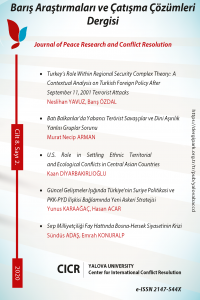RUSYA'NIN YAKIN ÇEVRE DIŞ POLİTİKASI VE AZERBAYCAN
Özet Sovyet sonrası Rus dış politikası, Atlantikçi bir bakış açısıyla başladı. Kısa bir süre sonra Avrasyacılığa doğru hızla değişti. Moskova, uluslararası arena’ya Büyük Güç olarak dönme arzusunu koruyarak, Sovyet sonrası dünyayı "Yakın Çevre" olarak tanımladı. Bu coğrafi alanda kendisini nihai güvenlik garantörü olarak gördü ve herhangi bir dış müdahaleye karşı hoşnutsuzluğunu dile getirdi. Genel olarak Kafkaslar ve özellikle Azerbaycan bu kapsamın içinde bulundu. Azerbaycan'ın enerji kaynakları ve enerji merkezi olma potansiyeli Moskova'nın yakın ilgisini çekti. Bu makale, Rus dış politikasının Azerbaycan'a yönelik olarak izlediği güvenlik ve ekonomik konularda yoğunlaşan yakın çevre kavramını öne çıkarmaktadır.Abstract Post-Soviet Russian foreign policy began with an Atlanticist outlook. It then quickly changed course towards Eurasianism. Yearning to return to the international stage as a Great Power, Moscow identified the post-soviet sphere as its ‘near abroad’. Within this geographical area it considered itself to be the ultimate security guarantor and expressed its displeasure towards any foreign interference. The Caucasus in general and Azerbaijan in particular came within this scope. The bountiful energy sources of Azerbaijan as well as its potential to be an energy hub attracted Moscow’s attention. This article highlights the near abroad concept focusing on security and economic issues that Russian foreign policy has pursued towards Azerbaijan.
Anahtar Kelimeler:
Rus Dış Politikası, Azerbaycan, Kafkasya
___
- Ambrosio, T. (2001). Russia's quest for multipolarity: A response to US foreign policy in the post‐cold war era. European Security, 10(1), 45-67. Baev, P. (2004). Could the ‘Deal of the Century’Still Live Up to Its Name?. Central Asia-Caucasus Analyst. Baev, Pavel K.; (2013), “Russia Plays on Azerbaijan’s Insecurity but Sinks into Its Own Troubles”, Istituto Affari Internazionali Papers 1309, 2013. Canar, B. (2012). Russian Federation's relations with Azerbaijan/Rusya Federasyonu'nun Azerbaycan ile iliskileri. Cankiri Karatekin Universitesi Iktisadi ve Idari Bilimler Fakultesi Dergisi, 2(1), 21-39. Canar, B. (2012), Rusya Federasyonu’nun Azerbaycan İle İlişkileri. Cassiday, J. A., & Johnson, E. D. (2013). A Personality Cult for the Postmodern Age. Putin as celebrity and cultural icon. New York: Routledge, 37-64. Clover, C. (1999). Dreams of the Eurasian Heartland- The Reemergence of Geopolitics. Foreign Affaırs., 78, 9. Dannreuther, R. (1999). Escaping the enlargement trap in NATO-Russian relations. Survival, 41(4), 145-164. Donaldson, R. H., & Nogee, J. L. (2014). The Foreign Policy of Russia: Changing Systems, Enduring Interests, 2014. Routledge. Dugin, A. (2004). Rus Jeopolitiği, Avrasyacı Yaklaşım. (V. İmanov, Çev). 2. B., İstanbul: Küre.
- Dugin, A. (2007). Moskova-Ankara Ekseni: “Avrasya Hareketi”nin Temel Görüşleri. (L. Bahrevski, Çev). İstanbul: Kaynak.
- İsmayilov, Elnur; (2013), “21. Yüzyıl Rusya Dış Politika Doktrinleri’nde Güney Kafkasya ve Orta Asya Değerlendirmesi”, Marmara Üniversitesi Siyasal Bilimler Dergisi, 1(1), 87-113, 2013. Kayumkhodjaev, Furkat, Pikalov, Aleksandr ve Ulbrich, Josefine; 2012, “Between Interest and Responsibility: Russia, the United States, and the Minsk Group as Mediators in the Nagorno-Karabakh Conflict”, University of St Andrews Centre for Peace and Conflict Studies, 2012. Kuzio, T. (2000). Geopolitical pluralism in the CIS: The emergence of GUUAM. European Security, 9(2), 81-114. Legvold, R. (Ed.). (2007). Russian Foreign Policy in the Twenty-first Century and the Shadow of the Past. Columbia University Press. Lepingwell, J. W. (1994). The Russian military and security policy in the ‘near abroad’. Survival, 36(3), 70-92. Light, M. (2003). In search of an identity: Russian foreign policy and the end of ideology. Journal of communist studies and transition politics, 19(3), 42-59. Makarychev, Andrey; (2015), “The South Caucasus Between Integration and Fragmentation - Russia's policies in The South Caucacus after the crisis in Ukraine:The Vulnerabilities of Realism”, The Center for Strategic Studies Under the President of Republic of Azerbaijan (SAM) ve European Policy Centre (EPS), May, 19-29, 2015. Mammadov, Farhad; (2015), “The South Caucasus Between Integration and Fragmentation- Azerbaijan's Foreign Policy, A New Paradigm of Careful Pragmatism”, The Center for Strategic Studies Under the President of Republic of Azerbaijan(SAM) ve European Policy Centre(EPC), MAY, 29-37, 2015. Mankoff, J. (2009). Russian foreign policy: the return of great power politics (Vol. 295, No. 10). Lanham, MD: Rowman & Littlefield. Marks, E. (1996). The CIS and the Caucasus (No. 90). NATIONAL DEFENSE UNIV WASHINGTON DC, INST FOR NATIONAL STRATEGIC STUDIES. Muradova, M. (2013). Vladimir Putin Visits Baku. The Central Asia-Caucasus Analyst, 4. Neumann, I. B. (2008). Russia as a great power, 1815–2007. Journal of International Relations and Development, 11(2), 128-151. Nygren, B. (2007). The rebuilding of Greater Russia: Putin's foreign policy towards the CIS countries (Vol. 4). Routledge. Rahr, A. (1992). 'Atlanticists' versus' Eurasians' in Russian foreign policy. RFE/RL Research Report, 1(22), 17-22. Sen, A. K. (2013). Azerbaijan: an American ally in a sea of threats. The Washington Times. Sokov, N. (2010). Missile defence: towards practical Cooperation with Russia. Survival, 52(4), 121-130. Sönmez, A.Sait; (2008), “Yakın Çevre Doktrini Bağlamında Yeltsin Dönemi Rusya Federasyonu’nun Bağımsız Devletler Topluluğu Ülkeleriyle İlişkileri”, 2008. Tarr, D. G. (2016). The Eurasian Economic Union of Russia, Belarus, Kazakhstan, Armenia, and the Kyrgyz Republic: Can It Succeed Where Its Predecessor Failed?. Eastern European Economics, 54(1), 1-22. Tezkan, Y. (2005). Süper Bir Güç: Rusya ve Türkiye. Tsygankov, A. P. (2016). Russia's foreign policy: change and continuity in national identity. Rowman & Littlefield. Turner, S. (2009). Russia, China and a multipolar world order: The danger in the undefined. Asian Perspective, 159-184. Routledge.
- Yıldırım, Zafer; (2012), “U.S. Foreign Policy towadrs Azerbaijan:From ‘Alliance’ to ‘Strategic Partnership’.”, Alternatives-Turkish Journal of International Relations, 11(4),16, 2012.
- Yayın Aralığı: Yılda 2 Sayı
- Başlangıç: 2012
- Yayıncı: Yalova Üniversitesi
Sayıdaki Diğer Makaleler
BAĞIMSIZLIK SONRASI JEOPOLİTİK VE GÜVENLİK EKSENİNDE KAZAKİSTAN’IN NÜKLEER SİLAHSIZLANMA SÜRECİ
RUSYA'NIN YAKIN ÇEVRE DIŞ POLİTİKASI VE AZERBAYCAN
Süreyya YİĞİT, Gökhan GÜLBİTEN
ABD İNSANİ ASKERİ MÜDAHALELERİNİ BELİRLEYEN FAKTÖRLER
ÇATIŞMA VE ÇATIŞMAYA YAKLAŞIM YÖNTEMLERİNİN TEORİK ÇERÇEVESİ
